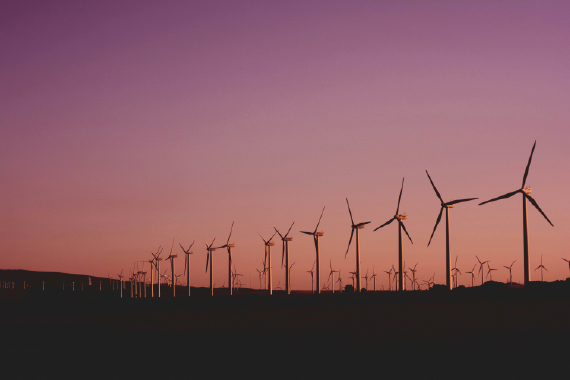We collaborate to achieve sustainable success
A leading environmental solution provider
Get in touch with usAccessing EU Funding for Your Decarbonisation Projects
The transition to a net zero economy demands unprecedented levels of investment. While global capital flows into clean energy are at record highs, Europe faces a significant climate investment shortfall that must be urgently addressed if it is to achieve its ambitious 2030 and 2050 climate targets. For businesses committed to decarbonisation, understanding this landscape and knowing how to access available funding is essential.
The European Investment Landscape: A Tale of Two Halves
Global investment in the energy transition reached a record $2.1 trillion in 2024, an 11% increase on the previous year. This surge highlights strong capital flows into low-carbon solutions across a range of sectors, including renewables, energy storage, hydrogen, and carbon capture. Indeed, clean energy technology investment is forecast to exceed upstream oil and gas investment for the first time in 2025, with solar PV alone accounting for half of all cleantech investments.
However, despite this global momentum, Europe faces a considerable investment gap. To deliver the EU’s 2030 climate and industrial policy objectives, an average of €842 billion per year will be required between 2025 and 2030. With climate investment reaching €498 billion in 2023, this leaves an annual shortfall of €344 billion.
This gap is particularly acute in critical sectors:
- Wind Power: Investment in 2023 amounted to just 29% of the annual requirement.
- Building Energy Renovation: Funding stood at roughly 34% of the annual target.
- Power Grids: Despite recent growth, a €19 billion deficit persists, crucial given grid connection is a key enabler of renewable deployment and wider electrification.
By contrast, some sectors show a funding surplus, such as solar power (€10 billion) and the energy performance of new buildings (€36 billion). While this reflects healthy investment activity, forecasts for 2024 suggest a slowdown in solar and battery manufacturing investment, raising concerns about future progress.
This significant deficit underscores the need for clear strategies that balance the roles of public and private finance, making use of fiscal levers, de-risking mechanisms, and regulatory tools.
EU Funding Initiatives: Mobilising Capital for the Transition
Recognising this gap, the European Union is mobilising substantial financial resources to support the energy transition and drive a clean industrial future:
- European Investment Bank (EIB) Group: The EIB Group is deploying €40 billion to bolster Europe’s energy security, competitiveness, and industrial leadership in clean technologies. This includes a €3.75 billion Clean Industrial Deal package in support of the European Commission’s Clean Industrial Deal and Affordable Energy Action Plan. The initiatives cover diverse areas, from semiconductors and affordable sustainable housing to hydrogen technology and offshore wind farms.
- Horizon Europe: As a flagship EU research and innovation programme, Horizon Europe has launched major funding calls for sustainability and energy efficiency projects, allocating €188.6 million with deadlines in February 2025. These calls focus on:
- Development of next-generation synthetic renewable fuel technologies.
- Smart concepts for integrated energy-driven biorefineries.
- Critical technologies for ocean energy farms.
- Innovative community-integrated photovoltaic (PV) systems.
- Carbon Capture and Utilisation (CCU) for fuel production.
- Robotics for sustainable construction and BIM-based processes for circular energy renovation.
- Digital solutions for participatory design of buildings and urban districts.
These programmes represent direct opportunities for businesses to access capital for clean energy projects, particularly those tackling Europe’s investment gaps.
How AFS Energy Can Help You Access Green Funding
At AFS Energy, our mission is to guide organisations towards robust climate solutions and help them navigate the complexities of the energy market. Our expertise positions us as a vital link between capital and critical decarbonisation initiatives:
- Strategic Project Alignment: We help you craft a tailored roadmap aligning your decarbonisation projects with business objectives and sustainability goals, enhancing their attractiveness to funders.
- Market Access to Environmental Trading: For projects involving environmental commodities such as carbon credits, EACs, GOs, PPAs, biomethane, biofuels, e-fuels, or renewable thermal certificates, AFS Energy provides direct market access, the latest product offerings, and timely market insights within relevant regulatory frameworks. This enables clients to leverage trading mechanisms to strengthen project viability and unlock additional revenue streams, crucial for attracting investment.
- Identifying Funding Opportunities: With a deep understanding of market conditions and regulatory landscapes, we assist clients in securing funding for projects in high-need areas, such as wind power, building renovation, and grid infrastructure.
- Compliance and Project Development Support: We connect clients with EU funding streams such as Horizon Europe and EIB programmes, offering support with project development, compliance, and grant optimisation to improve funding success.
- Market Insights: Our team provides valuable perspectives on how investment trends and funding initiatives can accelerate your adoption of clean technologies and reduce your carbon footprint.
The journey to net zero is capital intensive, but Europe is actively mobilising the necessary resources. By partnering with AFS Energy, your business can confidently navigate this funding landscape, seize financial opportunities, and accelerate its transition towards a sustainable and decarbonised future.


